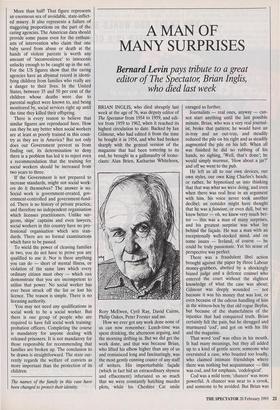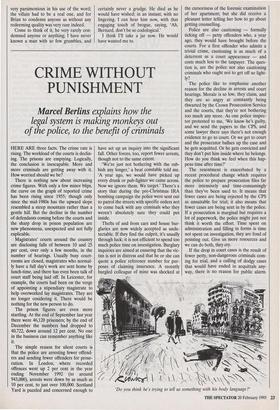A MAN OF MANY SURPRISES
Bernard Levin pays tribute to a great
editor of The Spectator; Brian Inglis, who died last week
BRIAN INGLIS, who died abruptly last week at the age of 76, was deputy editor of The Spectator from 1954 to 1959, and edi- tor from 1959 to 1962, when it reached its highest circulation to date. Backed by Ian Gilmour, who had edited it from the time he bought it in 1954, and who had broken sharply with the genteel version of the magazine that had been tottering to its end, he brought in a gallimaufry of icono- clasts: Alan Brien, Katharine Whitehorn, Rory McEwen, Cyril Ray, David Cairns, Philip Oakes, Peter Forster and me.
How we ever got any work done none of us can now remember. Lunch-time was spent drinking, the afternoon arguing, and the morning drifting in. But we did get the work done, and that was because Brian, who lifted his elbow higher than any of us and reminisced long and fascinatingly, was the most gently cunning coaxer of any staff of writers. His imperturbable facade (which in fact hid an extraordinary shyness and effacement) infuriated us so much that we were constantly hatching murder plots, while his Cheshire Cat smile enraged us further.
Journalists — real ones, anyway — can- not start anything until the last possible minute. Brian, who was a very real journal- ist, broke that pattern; he would have an in-tray and an out-tray, and steadily reduced the pile on his right and as steadily augmented the pile on his left. When all was finished he did no rubbing of his hands, no sighing, 'Well, that's done'; he would simply murmur, 'How about a jar?' and off we went to the pub.
He left us all to our own devices, our own styles, our own King Charles's heads; or rather, he hypnotised us into thinking that that was what we were doing, and even when there was real heat in an argument with him, his voice never took another decibel; an outsider might have thought that he was a fainéant, or even dull, but we knew better — oh, we knew very much bet- ter — this was a man of many surprises, and his greatest surprise was what lay behind the fagade. He was a man with an exceptionally well-stocked mind, and on some issues — Ireland, of course — he could be truly passionate. Yet his sense of perspective was perfect.
There was a fraudulent libel action brought against the paper by three Labour money-grubbers, abetted by a shockingly biased judge and a defence counsel who entered the court without the slightest knowledge of what the case was about; Gilmour was deeply wounded — not because it was his money that was lost, or even because of the odious handling of him in the witness-box by that old rogue Beyfus, but because of the shamefulness of the injustice that had conquered truth. Brian certainly felt the pain, but he shrugged and murmured 'cod', and got on with his life and the magazine.
That word 'cod' was often in his mouth. It had many meanings, but they all added up to a kind of gentle scorn; someone who overstated a case, who boasted too loudly, who claimed intimate friendships where there was nothing but acquaintance — this was cod, and for emphasis, `codologicar Cod was a mild term; 'chance? was more powerful. A chanter was near to a crook, and someone to be avoided. But Brian was very parsimonious in his use of the word; the villain had to be a real one, and for Brian to condemn anyone as without any redeeming quality was very rare indeed.
Come to think of it, he very rarely con- demned anyone or anything; I have never known a man with so few grumbles, and certainly never a grudge. He died as he would have wished; in an instant, with no lingering. I can hear him now, with that engaging touch of brogue, saying, `Ah, Bernard, don't be so codological.'
I think I'll take a jar now. He would have wanted me to.



























































 Previous page
Previous page